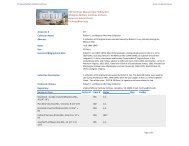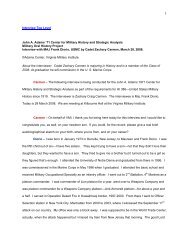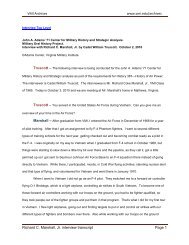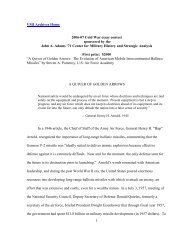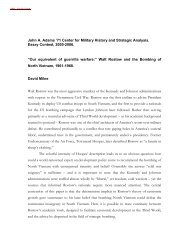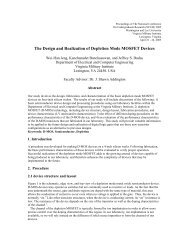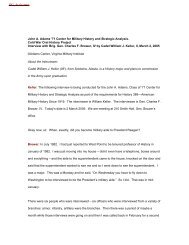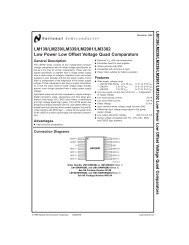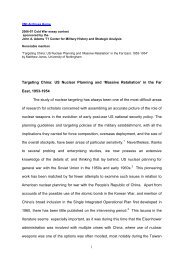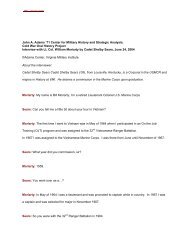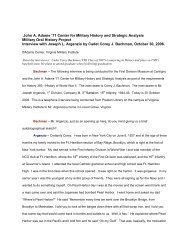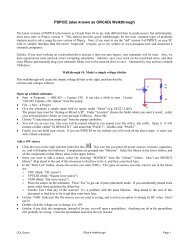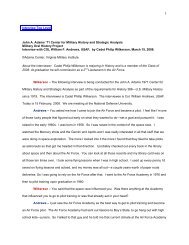Academic Catalog - Virginia Military Institute Admissions
Academic Catalog - Virginia Military Institute Admissions
Academic Catalog - Virginia Military Institute Admissions
Create successful ePaper yourself
Turn your PDF publications into a flip-book with our unique Google optimized e-Paper software.
<strong>Virginia</strong> <strong>Military</strong> <strong>Institute</strong><br />
12-13 <strong>Catalog</strong>ue<br />
BI 404. CELL BIOLOGY 3—3—4<br />
An introduction to cell structure and function including: membrane structure and physiology,<br />
functions of organelles, nuclear regulation, role of the cytoskeleton, the extracellular matrix,<br />
the cell cycle and cell death. Special emphasis is placed on the molecular biology of cellular<br />
processes and on current laboratory techniques including PCR and electrophoretic separation<br />
of nucleic acids and proteins. Prerequisites: CH 223, BI 101, and BI 102.<br />
BI 405. HISTOLOGY 3—3—4<br />
Histology is the study of anatomy at the tissue level. This course will examine the<br />
characteristics of the four basic tissue types and the structure and organization of organ<br />
and organ systems. The laboratory portion of the course will emphasize the identification<br />
of different tissue types and organs throughout the body based on tissue composition. This<br />
course is highly recommended for those students planning on pursuing a career in medicine.<br />
Histology will be offered on an every other year basis. Prerequisites: BI 101 and BI 102.<br />
BI 410. EVOLUTIONARY BIOLOGY 3—0—3<br />
This course is an introduction to the principles and processes of evolution, ranging from<br />
population biology to global dynamics. We will explore the wide array of obstacles faced<br />
by all creatures, the specifics of and unique scenarios in organismal adaptation, as well as<br />
the drivers behind those specific adaptations. Topics will include the theory of evolution by<br />
natural selection, patterns of speciation, concepts of fitness and adaptation, the genetic and<br />
developmental bases of evolution, basics of systematic and phylogeny, macro-evolutionary<br />
patterns, large-scale trends in extinctions, and human evolution. Students will explore primary<br />
literature in the field and participate in evidence-based group discussions on the biological<br />
evidence laying the foundation for evolutionary principles. Prerequisites: BI 101 and BI 102.<br />
BI 411. IMMUNOLOGY 3—0—3<br />
The course will focus on the human immune system. Students will first develop an<br />
understanding of the varied components of the immune system and then learn how those<br />
components interact to efficiently recognize and remove foreign invaders. Regulation of<br />
immune responses and immunpathologies will also be discussed. Prerequisites: BI 101,<br />
BI 102, and BI 204 or BI 302.<br />
BI 420W. BIOLOGY SEMINAR 3—0—3<br />
This course is required of all biology majors and is a writing intensive course. The course<br />
will follow a seminar format and the topics covered will be drawn from a broad range of<br />
areas in biology and will emphasize current developments in these areas. Cadets will lead<br />
discussions and write summaries for the topic they present. A term paper will be written on<br />
a specific area of interest in biology. Prerequisites: Completion of at least one course from<br />
each of the four areas and first-class status. Writing Intensive (W).<br />
BI 430. Molecular Biology 3—0—3<br />
Pre: BI 101, CH /224/225 (Organic), BC (CH) 421/422, BI 205 (Genetics) or BI 302 (Cell Biology)<br />
BI 490W and BI 491W. INDEPENDENT RESEARCH 0—4—2 to 0—8—4<br />
These courses are for first classmen pursuing research during the fall and/or spring<br />
semesters. Permission of instructor and department head required.<br />
business<br />
DEPARTMENT OF ECONOMICS AND BUSINESS<br />
DEPARTMENT HEAD: ColONEl DUNCAN<br />
Requirements for a major in economics and business are specified on page 50.<br />
*For all economics and business majors, the following courses must be completed with a<br />
grade of C or higher: MA 125, 126; WR 101, 102; EC 201, 202, 300, 303, 304, 330; BU 210,<br />
211, 220, 230, 310, 330, 316, 339, 440. In addition, a minimum grade point average of at<br />
least a C must be earned in all department courses.<br />
BU 210.* FINANCIAL ACCOUNTING 3—0—3<br />
Basic principles and concepts of accounting, recording and reporting transactions, and<br />
preparation and interpretation of periodic statements. Emphasis is on the rationale underlying<br />
accounting operations. Prerequisite: A grade of C or better in MA 125, MA 126, or equivalent.<br />
BU 211.* MANAGERIAL ACCOUNTING 3—0—3<br />
Analysis and use of both accounting data and periodic statements, operating and capital<br />
budgets, costing and control of operations, and various periodic profit-planning designs.<br />
Prerequisite: BU 210 with a grade of C or better.<br />
BU 215. FINANCIAL PLANNING 3—0—3<br />
A study of the fundamental principles of financial decision making. Overview of money<br />
management principles, to include asset management, investment products and planning,<br />
personal risk assessment, and insurance. Open to all majors. Prerequisite: completion of 6<br />
hours of math at VMI or equivalent. Note: This course cannot be taken by EC/BU majors or<br />
business minors as a business elective.<br />
BU 220.* PRINCIPLES OF MANAGEMENT 3—0—3<br />
The principles and processes of management in the private sector of the economy. Analysis<br />
of the managerial functions of planning, organizing, leading, and controlling, emphasizing<br />
ethics and social responsibility.<br />
BU 230.* PRINCIPLES OF MARKETING 3—0—3<br />
Analysis of the marketing function in business enterprise, including product development,<br />
pricing, distribution, and promotion for domestic and global markets. Includes study of<br />
market research, environmental scanning and analysis techniques.<br />
BU 305. INTERMEDIATE ACCOUNTING I 3—0—3<br />
An in-depth study of measurement issues and reporting requirements for assets, together<br />
with developing an understanding of the theoretical foundation of financial accounting. The<br />
emphasis is on the official pronouncements of the Financial Accounting Standards Board.<br />
Prerequisite: BU 210 with grade of C or higher.<br />
BU 306. INTERNATIONAL BUSINESS 3—0—3<br />
This is a course designed to increase the student’s awareness of the fundamentals of the<br />
international business environment, and focuses on the issues and problems confronting<br />
managers in international business. The international business environment includes viewing<br />
national differences in political economy and cultures, global trade, monetary policies,<br />
strategies and structures of international businesses, and how basic business functions<br />
are best performed on an international basis. Prerequisite: EC 201, 202.<br />
BU 310.* BUSINESS FINANCE 3—0—3<br />
The approach is from the viewpoint of management in making financial decisions for the<br />
firm. Business risk and valuation, capital budgeting, cost of capital, and the decision-making<br />
process are the four areas emphasized. Prerequisite: BU 210 with a grade of C or better.<br />
BU 316.* LEGAL ENVIRONMENT OF BUSINESS 3—0—3<br />
The law as a means to social, political, and economic change. The American legal system<br />
from the standpoint of its sources and its philosophy, with special emphasis on business<br />
relations and the role of government. The course should develop an understanding of the<br />
structural apparatus and techniques of the legal process.<br />
BU 320. BUSINESS MARKETING 3—0—3<br />
This course involves an analysis of the basic principles which govern marketing products<br />
and services to organizational customers rather than final consumers who buy goods and<br />
services for personal consumption. Attention is focused on the special problems connected<br />
with the management of the business marketing organization and the planning, purchase,<br />
distribution, promotion, and development of business goods and services. Prerequisite:<br />
BU 230.<br />
BU 322. HUMAN RESOURCE MANAGEMENT 3—0—3<br />
The knowledge, skills, and abilities of management and non management employees are<br />
essential in the attainment of organizational objectives. BU 322 examines the recruitment,<br />
selection, training, evaluation, and compensation of employees, within the constraints of<br />
operating efficiency and applicable federal and state laws. NOTE: <strong>Academic</strong> credit will be<br />
given for BU 322 or for PS 306, but not for both. Also, PS 306 will not count as a humanities or<br />
business elective. Prerequisite: BU 220 with a grade of C or higher.<br />
BU 330. MANAGEMENT INFORMATION SYSTEMS 3—0—3<br />
An introduction to the field of management information systems, to include basic information<br />
systems’ concepts, the use of MIS in systematic problem solving, and managerial implications<br />
involved with hardware, software, telecommunications, and database management.<br />
Prerequisite: BU 220.<br />
BU 335. web 2.0 for business 3—0—3<br />
The purpose of this course is to learn how the internet is changing the way business<br />
is done. New technology is making business more efficient, allowing them to increase<br />
their customer base, and helping them to improve their profitability. Topics include: social<br />
networking, blogging, wikis, collaboration/virtual teams, and media. Prerequisites: BU 220<br />
(basic knowledge of business practices is beneficial).<br />
BU 339.* OPERATIONS MANAGEMENT 3—0—3<br />
An introduction to operating management decisions which must be made to supply or<br />
produce the product or service of an organization. Integrating the major decision responsibilities<br />
of process, quality, capacity, and inventory issues through the use of cross-functional decision<br />
making is emphasized. Prerequisite: BU 220 and EC 303.<br />
BU 340. ENTREPRENEURSHIP 3—0—3<br />
Entrepreneurship is the processes and attitudes that result in organizational innovation,<br />
as the confluence of opportunities and ideas. Traditionally, the study of entrepreneurship<br />
focused on small and family businesses. However, large organizations have discovered the<br />
competitive necessity of flexibility and creativity, functioning as if they were small. BU 340 is<br />
integrative and applicative, utilizing concepts from core courses in business and economics.<br />
Prerequisite BU 220 or permission of instructor.<br />
BU 411. PRINCIPLES OF INVESTMENT 3—0—3<br />
An introduction to investment in securities. Within the context of the institutional and financial<br />
environment, the course offers a practical and theoretical analysis of stocks, bonds, and<br />
derivative securities. Emphasis on valuation, risk, market mechanics, security analysis and<br />
market efficiency. Prerequisites: BU 310 with a grade of C or higher or permission of instructor.<br />
BU 412. PORTFOLIO MANAGEMENT 3—0—3<br />
A practical and theoretical examination of investment management techniques and capital<br />
market theory. Emphasis on the construction and management of equity and fixed income<br />
portfolios using passive and active strategies. Portfolio diversification, performance evaluation<br />
and investment policy statement development are also studied from the perspective of the<br />
manager and the client. Prerequisites: BU 310 with a grade of C or higher or permission<br />
of instructor.<br />
81




